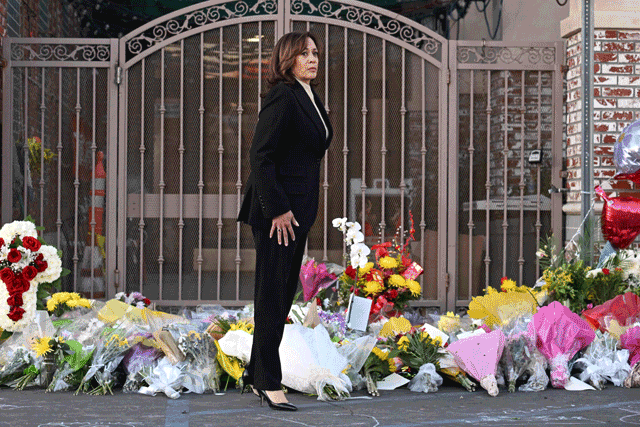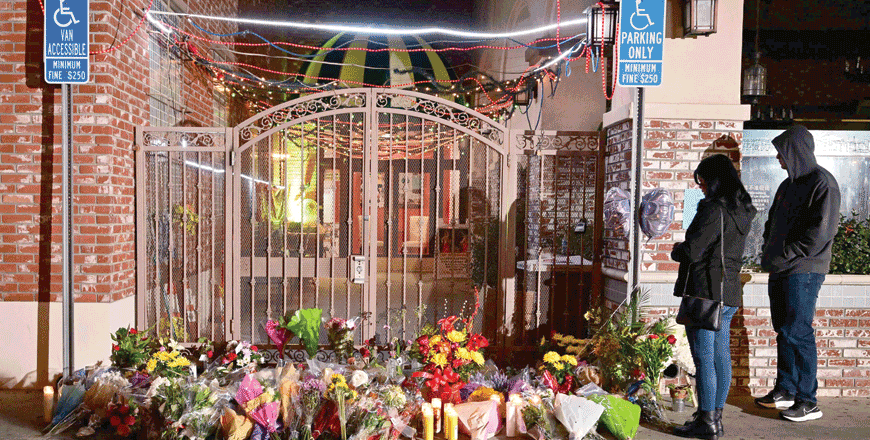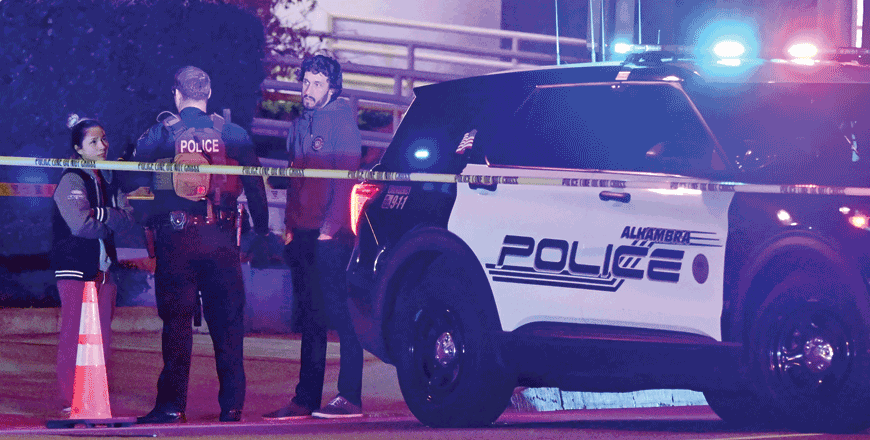You are here
Elderly, Asian gunmen outlier in US mass shootings
By AFP - Jan 26,2023 - Last updated at Jan 26,2023

US Vice President Kamala Harris leaves flowers at a makeshift memorial at the Star Ballroom Dance Studio in Monterey Park, California, on Wednesday (AFP photo)
WASHINGTON — Mass shootings in the United States have become agonisingly common, but the two recent tragedies in California stand out for their difference: The alleged attackers were men of Asian descent, both elderly.
The typical profile for a shooting in a public space with a large number of casualties is a white male under 40, and white men under 21 have featured particularly in some of the most recent.
But the man who is suspected of killing 11 people at a suburban Los Angeles dance hall on Saturday was 72-year-old Huu Can Tran, with apparent roots in Vietnam and China.
And the man accused of two days later shooting dead another seven people in Half Moon Bay south of San Francisco, Zhao Chunli, is ethnic Chinese and 66 years old.
The suspects’ demographic details meant the two attacks drew more attention than usual in a country where mass shootings are now relatively common.
Both took place as many of the 20 million in the Asian American and Pacific Islanders community in the United States were celebrating the Lunar New Year.
The nonpartisan Violence Project says 79 percent of mass shooters from 1966 to 2020 were under the age of 45, and just 6.4 per cent were Asian — roughly equivalent to their proportion of the US population.
A new report by the US Secret Service, which studied 173 violent attacks in public spaces from 2016 to 2020, said the average attacker age was 34, and that only four percent were Asian.
“Lunar New Year marks an important cultural holiday for many Asian Americans and to have a day of celebration be upended by staggering violence leaves us heartbroken,” said the National Council of Asian Pacific Americans after the assaults.
In both attacks, the suspected perpetrators were familiar with the location and the victims, most of whom were fellow members of California’s Asian community.
Tran is alleged to have attacked a popular ballroom dance hall he had long attended, and Zhao is accused of targeting two farm businesses where he had reportedly worked.
After being confronted by police, Tran shot himself dead, while Zhao — arrested without serious injury and charged with multiple murders — could face the death penalty.
Lina Alathari, head of the Secret Service’s National Threat Assessment Centre, would not comment specifically on the two California attacks.
But neither stood out as especially unusual when weighed against the centre’s study released on Wednesday.
“Across the five-year timeframe and every year we’ve studied, by far grievances were the top motive for these attacks,” Alathari told reporters.
“These were attackers retaliating for some sort of perceived wrongs that may have been related to either personal issues, domestic situations with partners, as well as workplace issues,” she said of those in the study.
Attacks against workplaces and community halls are highly common, and in nearly half, attackers had an affiliation with the target.
And whatever ethnic group they are, generally they were lone actors, male, and armed with high-powered firearms.
“There is no community that’s immune from this,” Alathari told reporters.
“There’s no profile of the type of community. It’s occurred in communities [of] just a few hundred residents, as well as major metropolitan areas,” she said.
The deadliest mass shooting in US history, the October 2017 attack on an outdoor concert in Las Vegas, Nevada that left 61 dead and hundreds injured, remains mostly unexplained, and the shooter there was also older than average: he was white, 64, and his motives remain unknown.
The second most deadly, the massacre of 49 at an Orlando, Florida gay nightclub in 2016, is better understood.
The 29-year-old alleged killer was supposedly radicalised by ideology from the so-called Islamic State group and specifically targeted the LGBTQ community.
But some of the most horrific recent attacks have been by very young white men, driven by racist ideologies.
The man who killed 23 in an El Paso, Texas supermarket parking lot in 2019 was 21 and espoused anti-Hispanic hate.
An 18-year-old white man who killed 10 at a Buffalo, New York supermarket in May 2022 specifically targeted African Americans.
Alathari said that the only way to prevent such attacks is for communities, workplaces, schools and other groups to take note of people with worrisome behaviour and for them to be willing to investigate further.
A large percentage of mass attackers have already had previous run-ins with law enforcement, and half have histories of physical aggression and violence, including many who are domestic abusers, according to Alathari.
“We see a lot of the same warning signs and behaviours that we really should be looking at when someone is eliciting concern,” she said.
To prevent attacks, she added, “we really should set a low threshold for concerning behaviour, to make sure we’re asking the right questions, to see if that individual is escalating towards violence.”
Related Articles
MONTEREY PARK, United States — Asian Americans were reeling on Tuesday after two mass shootings in California targeting members of their com
HALF MOON BAY, United States — A suspected gunman was in custody Monday over the killing of seven people in a rural community in northern Ca
MONTEREY Park, United States — Ten people have died and at least 10 others have been wounded in a mass shooting in a largely Asian city in s















